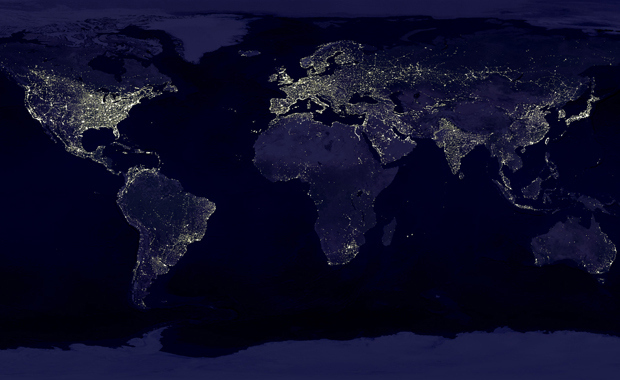
Even if we are spared destruction by war, our lives will have to change if we want to save life from self-destruction. -- Alexander Solzhenitsyn, 1978 Harvard Commencement Address
The warmest year in U.S. history. Hurricane Sandy. The majority of Americans now believe that climate change is caused by human actions, but they don't really act on this belief, as they steer their massive SUVs to record-breaking Black Friday sales. Despite the evidence of climate change that is all around us, why don't we change our personal behaviors, and our public policies? Oxford professor Dieter Helm, in his new book, The Carbon Crunch quotes biologist Edward O. Wilson's 1997 essay "Is Humanity Suicidal?"
"Unlike any other creature that lived before, we have become a geophysical force, swiftly changing the atmosphere and climate as well as the composition of the world's fauna and flora...No other single species in evolutionary history has ever remotely approached the sheer mass in photoplasm generated by humanity."
This quote sent me scurrying to online dictionaries to uncover the meaning of the highly evocative word "photoplasm." A rare and exciting occurrence for a logophile: "no results found." The only other usage of the term seems to be on websites devoted to ghosts. So I feel free to assign to photoplasm the following meaning: similar to protoplasm, living cellular matter, but all lit up as viewed from an orbiting spacecraft, creating a phosphorescent haze around the globe, pulsating at major population centers. Ten thousand years from now, will these lights still shine, or will we become yet another dark planet with no visible signs of life? It is a haunting possibility.

Global Light Pollution. Data courtesy Marc Imhoff of NASA GSFC and Christopher Elvidge of NOAA NGDC. Image by Craig Mayhew and Robert Simmon, NASA GSFC.
In the midst of general hopelessness and expectations of more superstorms, I appreciate Professor Helm's rational approach to climate change, which acknowledges the role of politics, but is not rooted in it. Helm concludes at the end of his fully researched book "It is not beyond the wit -- and the sheer ingeniousness -- of humans to crack climate change". He does not advocate a world of whirling, noisy windmills. Instead, he believes a gradualist approach to curbing carbon consumption could be a realistic alternative, moving from coal to gas for example. However, he can be scathing when it comes to efforts he sees as misdirected:
"Our current path is not getting us anywhere. The emissions keep going up and nothing of substance has yet been achieved after more than two decades of effort...All the international summits and agreements have been little more than showmanship...None of this should be at all surprising for it is based on what to all intents and purposes is analogous to a fairy tale. Along comes what could be one of the greatest threats in human history, and it is claimed that the energy sector can be converted from an overwhelmingly carbon-based one to almost zero carbon in the space of half a century, all at just a small cost, or even a profit, based on the simplistic assumptions about economic growth...The fantasy is that it will cost us little or indeed nothing than we would have paid anyway, and this is a deceit that lies at the heart of the failure to achieve much over these two decades of trying."
In other words, the chimera of a perfect of world with clean, free energy is destroying what could be a better world that is dependent on less harmful forms of carbon energy. Growth in the emerging economies, while desirable on many levels, has created a new set of problems. China has dramatically increased its use of coal, pushing worldwide consumption from 25 to 30 percent of world energy use. Now that China's growth is slowing, can we expect a new government heavily burdened with multiple agendas to make an investment in reducing carbon emissions? Even if Beijing agrees, there are many barriers to implementation at the local level.
Just as government plays the critical role in disasters such as Hurricane Sandy, climate change is an issue that must be dealt with on a global level. Here we come to a key institutional weakness in terms of global governance. There is no override that can be deployed to stop any nation from wreaking havoc on its neighbors. In the absence of such institutions, Helm proposes a cross-border carbon tax.
Perhaps unfairly, China has been called to task for its resource consumption. However, as one link in the global manufacturing chain, about half of what China consumes as a manufacturer is exported to high-wage nations with higher thresholds of environmental regulation. When U.S. companies exported jobs to China, they also exported pollution. In order to create a truly fair carbon tax, Helm says that this import loophole must be taken into account. In this sense, the recent upsurge in manufacturing in the U.S., along with our increasing energy independence, is all good news.
California has implemented a "cap and trade" approach to limiting carbon emissions and lowering greenhouse gases, which could be a model for the rest of the country and other countries as well. This is essentially a new tax that has also resulted in significant revenues for the cash-strapped state.
While I was writing this article, I was reminded by a friend of the play by Henrik Ibsen, Enemy of the People. A doctor in a Norwegian town discovers that a tannery upstream has tainted the baths that have made the town prosperous. He is dismayed that no one is interested in his solution, which is neither quick nor cheap. The majority wants to continue their lives, ignoring the danger:
"What sort of truths are they that the majority usually
supports? They are truths that are of such advanced age that they are
beginning to break up. And if a truth is as old as that, it is also in
a fair way to become a lie, gentlemen." -- Henrik Ibsen, An Enemy of the People
In addition to the fiscal cliff, we are also facing a physical cliff in terms of degradation of our environment. By the time practical solutions to climate change are implemented, which will involve a not inconsiderable initial investment as well as behavioral changes, will it be too late? By the time the majority of nations agree on what to do, will they agree on what is truly feasible?
I am not concerned by the science, or by the economics of better energy utilization and climate change. Both ideas and information are plentiful. Capital is available. What I am worried about is the adolescent tendency we have to think we are indestructible. After all, it is highly improbable that any of us are here at all. In nature there is no guarantee that we will continue to survive and thrive. We do not comprehend our own fragility. Unlike the ants studied by Edward Wilson, we seem incapable of sacrificing for the good of the whole. We are facing political failure on a global scale, with global consequences. So my answer to Wilson's question is, yes, we are suicidal. All we can do is hope that nature is more resilient than we dare imagine.
By Lyric Hughes Hale:
Lyric Hughes Hale is the author of What's Next and a contributor to a range of publications, including the Financial Times, Los Angeles Times, USA Today, Current History, and Institutional Investor. "China Takes Off", published in 2003 and written jointly with her husband David Hale, is one of the most oft-cited surveys of China's economic ascendency. Ms. Hale studied Japanese at Northwestern University and graduated from the University of Chicago with a degree in Near Eastern Languages and Civilizations. She has lived and studied in Europe, Asia, and the Middle East.
 This post originally appeared at the Yale Books blog.
This post originally appeared at the Yale Books blog.
What's Next? Unconventional Wisdom on the Future of the World Economy by David Hale and Lyric Hale is available now from Yale University Press.
Synopsis: Yale author Lyric Hughes Hale reads The Carbon Crunch by Dieter Helm and asks some troubling questions regarding humanity's attitude to itself. Are the arguments concerning climate change underpinned by a belief in our own indestructibility? Do we appreciate the precariousness of our global political, economic and environmental situation? Is humanity suicidal?

